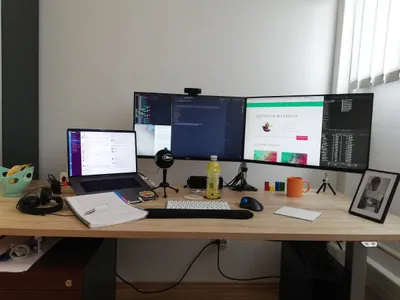Remote Working Hub is a place where you could find useful information about remote working. I have been asked to share my remote working experiences. I said to myself, why not.
Hey, can you please introduce yourself?
I am Silvestar Bistrović, a fearless web engineer, CSS developer, JAMstack enthusiast, and WordPress theme specialist.
I live in Osijek, Croatia, where I was born and raised. I have acquired a master’s degree in Electrical Engineering from the Faculty of Electrical Engineering in Osijek. Even today, I am working remotely from my office in Osijek :-).
I started learning to programme in 2011 and began work as a PHP web developer in 2012. Although I have enjoyed working with PHP and backend technologies, my passion was the frontend. In 2015, I started working as a frontend developer in a local startup. In 2017, I became a freelance developer.
Today, I am enjoying creating pixel-perfect, responsive, and modern websites for clients all over the world. I have worked with clients from more than 10 countries, from Saudi Arabia to Germany and Spain, to the United States.
My focus is always on delivering the best experience for users on every device. Making faster, lighter, and more secure sites using WordPress or Static Page Generators is my specialty.
When I am not coding, I like to write new articles on my blog.

What motivated you to choose remote working?
Remote working was something that was always on my mind. In 2017, the company I was working for had to shut down, which was like a sign that I should try my luck in freelancing. So, after a few short gigs, I realised I was capable of working remotely. After that, I have joined a formidable talent network as a UI developer (one of the first ones) and landed a great gig within a month.
The biggest motivation was to work with professionals all over the world. I have been lucky to have a chance to work with great professionals from the very beginning of my journey.
Challenging and exceptional projects were the second reason. I always wanted to work on projects where my ideas and vision could be beneficial for building a stable codebase for easier maintenance and flexibility.
What were your initial months like? Did it live up to your expectations?
My first months were extraordinarily successful. As I said earlier, I landed a big gig within a month after joining the talent network. The job was challenging and fulfilling, and I enjoyed working on it.
But after a few months when the first gig ended, I struggled to find a new gig. It was the biggest struggle and the most crucial test in my remote career. Luckily, it only lasted for a couple of months. It may seem like an extended period (and it was), but I am kinda thankful it happened. It made me look at the remote career from another perspective. It also taught me that remote working is something that takes time to master.
How did you find remote working roles?
When I was starting, most of my clients came from a particular talent network. I was very fond of bidding and matching process at this network, and I had no bigger problems to land a new client.
Since, I have invested a lot of time to post meaningful content on my site by publishing blog posts and portfolio projects. Some of my blog posts were featured in newsletters, like CSS Weekly, and some posts started meaningful discussions on websites, such as Hacker News.
This helped me gain more audience and more confidence. So, I also began publishing articles for prominent publications like LogRocket, Toptal Blog and most recently, CSS-Tricks. All this effort was not useless—clients began to contact me directly!
What have been the best, good and worst aspects of remote working for you?
The best aspect of remote working is spending more time with my family. When I don’t have tasks, I stay home. When I complete all my tasks earlier, I go back to my family. That is something that a 9-to-5 job cannot ever replace.
The good aspect of remote working is to be able to invest time in technologies I chose. A good example is when, back in the day, I started working with static sites. That was the right decision with all the latest hype about serverless technologies. Now, I am able to enjoy working with serverless technologies for actual remuneration.
The worst aspect of remote working for me is the struggle to find a new gig. I realised that I was spending a considerable amount of time and energy on finding a new gig. The frustration of not landing my next dream job was eating me alive. I couldn’t accept the decision that I was not good enough.
Today, I know that I am not a good fit for just any job out there. Maybe, I don’t present my skills to the client in the right manner, or my rate is not in the client’s range. You could never know for sure, and that is something that every remote worker should learn and accept.
What tools do you swear by while working remotely?
Visual Studio Code is my most used tool for getting the job done. I like how easy it is to use this code editor, how everything works as expected, and how productive I am while using it. I also use Chrome as my go-to browser for testing, debugging and developing tasks. You could read which Chrome extension I like to use here: https://www.silvestar.codes/articles/my-favorite-chrome-extensions-for-web-development-mostly/.
There are other tools that I use on my daily basis that are related to my programming job, like Git and iTerm2 terminal. I use gitflow (https://github.com/nvie/gitflow), a Git extension to provide high-level repository operations for Vincent Driessen’s branching model. I am so used to this extension that I cannot imagine working on a Git-based project without it anymore.
I made a list of my current hardware setup and my preferred software. You can find it here: https://www.silvestar.codes/uses/.

Your most exciting/ hilarious experience since you started working remotely.
The funniest experience since I started remote work was related to a daily meeting call. At the time of this call, I was working from home. I was supposed to put my one-year-old daughter to sleep. As these things tend to be very complicated and unpredictable, my daughter refused to sleep. I decided to place her in front of the TV and hoping she won’t make too much noise. In the middle of a call, she started talking to me, which led to a hilarious situation. Eventually, I had to take her and introduce her to the whole team :P.
What is your golden advice to a new remote worker?
If I had to give only one piece of advice to a new remote worker, it would be to always have substantial savings. This is especially important at the beginning of your career. When you are struggling to find a new gig, and you don’t have savings, you might consider accepting a job that you don’t want to do. This is rarely a good scenario because you would never be happy with the job, and your client might not be satisfied with your performance.
Related to this advice, I would also tell a new remote worker to start finding new gigs on time. You don’t have to wait for your current gig to be finished to start looking for a new one. This could help you avoid significant periods without a job.
Secondly, making your own schedule is a good aspect of remote working. Although I thought I wouldn’t work out of an office again after I worked from home, I was wrong.
Having a place to go to work, making and sticking to your schedule, and having a clear distinction between work and home environment are my advice for every remote worker:
- Find yourself an office,
- Spend some time to make a work schedule, and
- Limit working from home to a minimum.
How do you see your career shaping up and your goals?
So far, my career has been skyrocketing beyond my wildest expectations. I am in a situation where clients are waiting in line to work with me. If you had told me at the beginning of my remote career that I would be working on some of these projects, I would have laughed at you. That is what I like in remote working—it is all about your skills, and not about where you live. I think my hard work and commitment to previous projects have paid off, and now I could enjoy my everyday work.
Not all of my goals have been fulfilled. I would like to have more time to produce more blog articles and courses. I would like to publish articles on more websites. I would like to create a better version of my site and side projects. I would like to learn new technologies, like React, or even a new programming language, like Go. I would like to help more people learn how to code. Well, there is always something on my goal list—I hope it would never be empty!
How do you expect remote working to evolve in the future?
Last year, a friend of mine asked me about my career and my job. When this happens, I always take time and try to explain every aspect of my job. He quit his job in his attempt to pursue happiness as a web developer. I am proud to be a mentor to this friend and see him evolve as a remote professional.
I hope more people realise the benefits of remote working. I would be thrilled to see more people joining this crazy rollercoaster that is remote work. My city is full of remote workers. If it is gaining popularity in Osijek, Croatia, I could see it gain rapid traction in the rest of the world too.